As a pet owner, the realization that your dog is getting older can be emotionally challenging. It’s natural to feel sadness and grief knowing that your beloved furry friend is entering their twilight years. However, it’s important to prepare yourself for this inevitable reality and find healthy strategies to cope with the emotional toll it may take on you.
Key Takeaways:
- Coming to terms with your dog’s aging process can be difficult, but accepting it allows you to cherish the time you have together.
- Create happy memories by spending quality time with your aging dog and engaging in activities they enjoy.
- Seek support from friends, family, or fellow pet owners who can empathize with your emotions.
- Take care of yourself by engaging in self-care activities and maintaining your emotional resilience.
- Remember the unconditional love your dog provides and focus on the deep bond you share.
Understanding the Aging Process of Dogs
As our beloved furry companions age, it’s important for us to understand the natural process that they go through. Recognizing the signs of aging in dogs enables us to provide them with the care and support they need during this stage of their lives. Common signs of an aging dog include changes in weight, diminished hearing and vision, dental issues, and decreased energy levels. It is crucial to be attentive to these changes and address them promptly to ensure the well-being of our older dogs.

Just like humans, dogs require specific care as they grow older. The key to caring for an old dog lies in maintaining their overall health and quality of life.
Caring for an old dog involves providing them with a balanced diet that suits their age and health condition. Regular exercise remains essential to keep their muscles strong and maintain their joint mobility. It is also crucial to schedule regular visits to the veterinarian for check-ups and to address any health concerns promptly.
| Signs of an Aging Dog | Caring for an Old Dog |
|---|---|
| Changes in weight | Provide a balanced diet and monitor their weight closely. |
| Hearing and vision problems | Be patient and provide a safe environment. |
| Dental issues | Maintain proper dental hygiene and schedule regular dental check-ups. |
| Decreased energy levels | Adapt exercise routines and provide mental stimulation. |
Understanding and addressing the aging process in dogs allows us to ensure their comfort and happiness during their golden years. By providing them with appropriate care and attention, we can make this stage of their lives as enjoyable and fulfilling as possible.
Cherishing the Present Moments with Your Aging Dog
As my dog continues to age, I’ve learned the importance of cherishing the present moments we have together. Instead of focusing on the sadness that comes with their aging process, I’ve made it a priority to create happy memories and spend quality time with them. It’s essential to adapt their routine to accommodate any physical limitations they may have and engage in activities that bring them joy.
Whether it’s going for gentle walks in the park, playing their favorite games, or simply snuggling up on the couch, these moments are precious and create a strong bond between us. I prioritize their comfort and happiness, ensuring that their needs are met and that they feel loved and cherished every day.
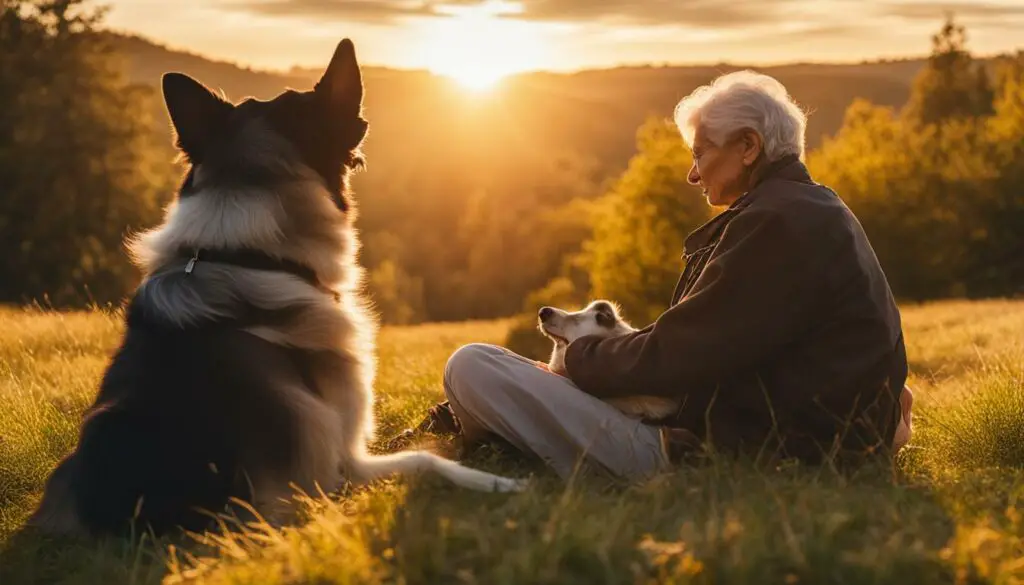
Making Adjustments and Celebrating Life
While it’s natural to mourn the passing of their youthful days, I’ve found that adjusting to their changing needs and celebrating the life they’ve lived brings a sense of fulfillment. It’s important to provide them with the necessary care, such as a nutritious diet and regular veterinary check-ups, to support their overall well-being. Additionally, making their environment comfortable by providing cozy bedding and ensuring easy access to food and water can greatly enhance their quality of life.
“Cherishing the present moments with my aging dog has helped me appreciate the beauty of each day and the unconditional love they continue to give.”
By embracing these changes and adapting to their needs, I’ve witnessed their resilience and their ability to find joy even in the simplest moments. It’s a reminder to live in the present and treasure the time we have together.
Creating Lasting Memories
I’ve also found solace in capturing and preserving the memories we’ve made throughout the years. Whether it’s through photographs, videos, or a journal, these mementos serve as a reminder of the love and happiness we’ve shared. Looking back at these moments brings a sense of comfort and helps me reflect on the incredible journey we’ve had together.
In conclusion, coping with an aging dog requires a shift in perspective. By cherishing the present moments, making adjustments to support their changing needs, and creating lasting memories, we can navigate this emotional journey with love and grace. Our aging dogs deserve our attention, care, and unconditional support as they continue to bring joy and companionship into our lives.
Supporting Your Senior Dog: Nurturing Their Emotional Well-being
Supporting my senior dog is not just about their physical health but also about their emotional well-being. As dogs age, they may experience various emotional changes that require our understanding and support. Being aware of the emotional impact of aging on our furry companions allows us to provide the care and comfort they need during this stage of their lives.
One way to support our aging dogs emotionally is to create a peaceful and comfortable environment for them. Providing a quiet space where they can relax and feel safe helps reduce any anxiety or stress they may be experiencing. This can be a cozy bed in a calm corner of the house or a designated area where they can retreat to when they need some solitude.
“Dogs have a remarkable ability to sense our emotions and can be profoundly affected by our moods.”
Understanding the emotional cues
Another important aspect of supporting our senior dogs is to pay attention to their emotional cues. Dogs have a remarkable ability to sense our emotions and can be profoundly affected by our moods. If we are feeling sad or stressed, they may pick up on those emotions and become more anxious or unsettled themselves. By staying calm and positive, we can help create a soothing and reassuring atmosphere for our aging companions.
Spending quality time with our senior dogs is also crucial for their emotional well-being. Engaging in activities they enjoy, such as gentle walks or playtime, helps keep their minds stimulated and provides them with a sense of joy and fulfillment. Additionally, regular affection and praise can go a long way in boosting their spirits and reinforcing the bond we share.
| Ways to Support Your Senior Dog Emotionally | Benefits |
|---|---|
| Creating a peaceful environment | Reduces anxiety and stress |
| Paying attention to emotional cues | Helps create a soothing atmosphere |
| Spending quality time together | Keeps their minds stimulated and reinforces the bond |
| Providing regular affection and praise | Boosts their spirits and strengthens the emotional connection |
Supporting our senior dogs emotionally is a crucial aspect of their overall well-being. By creating a nurturing environment, understanding their emotional cues, and spending quality time together, we can provide the love and support they need during the later stages of their lives.

Navigating the Challenges of an Aging Dog
Dealing with the aging process of a beloved dog can present various challenges that require careful navigation. As our furry friends enter their senior years, it’s important to adapt to their changing needs and provide the support they require. By understanding the challenges that come with an aging dog, we can effectively address them and ensure their well-being.
One of the main challenges faced when dealing with an aging dog is their physical limitations. As dogs age, they may experience mobility issues, joint pain, and decreased energy levels. It’s crucial to create an environment that is safe and comfortable for them. Providing soft bedding, easy access to food and water, and minimizing stairs or slippery surfaces can help alleviate some of these challenges.
Additionally, cognitive decline can be another challenge that arises with an aging dog. Dogs may experience memory loss, confusion, and changes in behavior. It’s important to remain patient and understanding during these times, as they may require additional care and reassurance. Engaging in mentally stimulating activities, such as puzzle toys or gentle training exercises, can help keep their minds sharp and alleviate some of the cognitive challenges they may face.
| Challenges of an Aging Dog | Strategies to Address |
|---|---|
| Physical limitations |
|
| Cognitive decline |
|
Dealing with the challenges of an aging dog requires patience, understanding, and a willingness to adapt to their changing needs. By addressing these challenges head-on, we can ensure that our furry friends enjoy a comfortable and fulfilling senior life.
Remember, each dog is unique, and their individual needs may vary as they age. Regular visits to the veterinarian can help identify and address specific challenges your aging dog may face. By providing them with proper care, love, and support, we can navigate the challenges of their aging process and ensure they have a happy and fulfilling senior life.
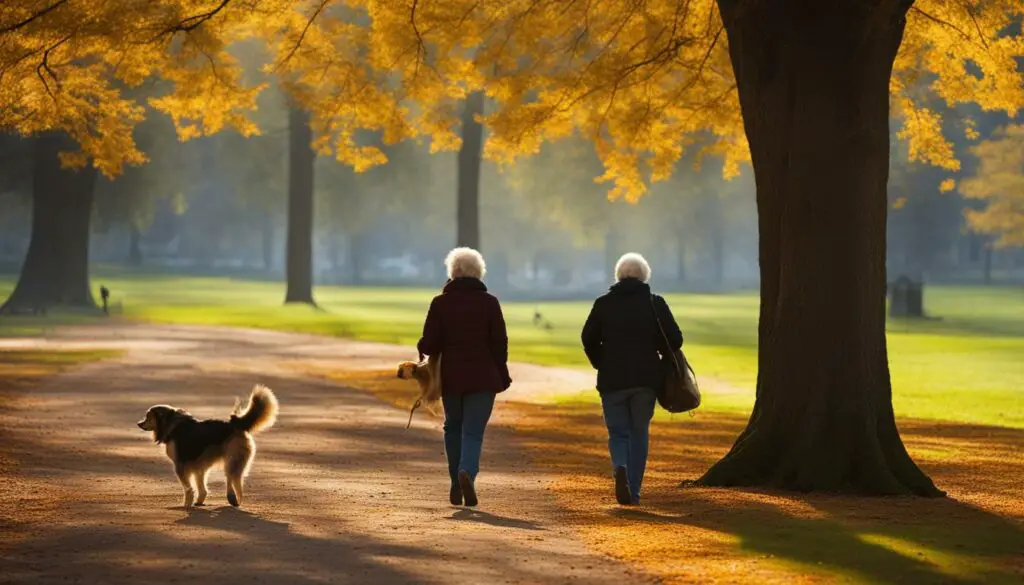
Seeking Support from Others
The emotional toll of an aging dog can be challenging to navigate alone. It’s important to have a support system in place to help you through this journey. Reach out to friends, family, or fellow pet owners who can understand and empathize with your feelings. Talking about your emotions and concerns can provide comfort and alleviate some of the sadness you may be experiencing.
“Having someone to lean on during this difficult time has made a world of difference,” says Sarah, a dog owner whose furry friend recently turned 12. “Sharing my worries and getting support from fellow pet owners who have been through it has helped me feel less alone.”
“Remember, you are not alone in this journey. There are others who are going through the same experience and can offer you guidance and support,”
advises Dr. Emily Johnson, a veterinarian specializing in senior pet care. “Don’t hesitate to reach out and lean on your support network when you need it.”
Joining online pet owner communities or attending local support groups can also provide a sense of camaraderie and understanding. Sharing stories, advice, and even finding solace in the experiences of others can be a valuable source of support,” suggests Dr. Johnson.
Support Resources for Aging Pet Owners |
|
|---|---|
| 1. Pet Loss Support Groups | These groups offer a safe space to mourn the loss of a pet and connect with others who have experienced similar grief. |
| 2. Online Forums | Join online communities or forums dedicated to pet owners to find support, share stories, and seek advice when dealing with the emotional toll of an aging dog. |
| 3. Veterinary Professionals | Consulting with veterinarians who specialize in senior pet care can provide valuable guidance and emotional support during this challenging time. |
| 4. Local Pet Owner Meetups | Participate in local pet owner meetups to connect with fellow dog owners, share experiences, and find solace in the company of others who understand the emotional toll of an aging pet. |
Remember, seeking support is not a sign of weakness but a testament to your love and dedication to your aging furry companion. Together, you can find solace, empathy, and strength as you navigate this emotional journey.
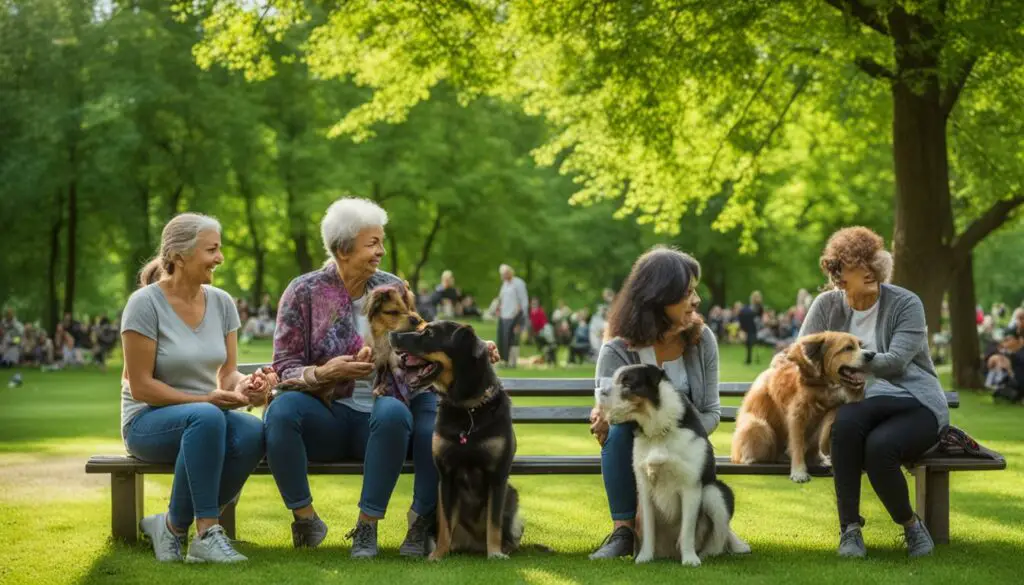
Seeking Guidance from Professionals
When dealing with the challenges of an aging dog, it can be beneficial to seek guidance from professionals who specialize in veterinary care. Consulting a veterinarian can provide you with professional advice and support tailored to your dog’s specific needs. Veterinarians have the knowledge and experience to help you navigate the challenges that come with caring for an aging dog.
Whether you have concerns about your dog’s health, behavior, or overall well-being, a veterinarian can offer valuable insights and recommendations. They can help you create a customized care plan that addresses your dog’s individual needs and ensures they receive the necessary medical attention. From managing chronic conditions to providing pain management strategies, veterinarians can guide you on how to best support your aging dog.
Additionally, veterinarians can provide advice on nutrition, exercise, and lifestyle adjustments to optimize your dog’s quality of life during their senior years. They can recommend suitable diets, supplements, and exercise routines that support your dog’s aging body. By consulting a veterinarian, you can ensure that you are providing the best possible care for your furry companion.
| Benefits of Seeking Professional Advice for Handling an Aging Dog |
|---|
| Expert guidance tailored to your dog’s specific needs |
| Access to medical care and treatment options for age-related conditions |
| Recommendations on nutrition, exercise, and lifestyle adjustments |
| Assistance with pain management and symptom relief |
| Peace of mind knowing that you are providing the best care for your aging dog |
Remember that veterinarians are not only there for your dog’s well-being but also for your peace of mind. They can address any concerns or questions you may have and provide emotional support as you navigate the challenges of your dog’s aging process. Seeking professional guidance can help alleviate stress and uncertainty, allowing you to focus on cherishing the time you have with your beloved companion.
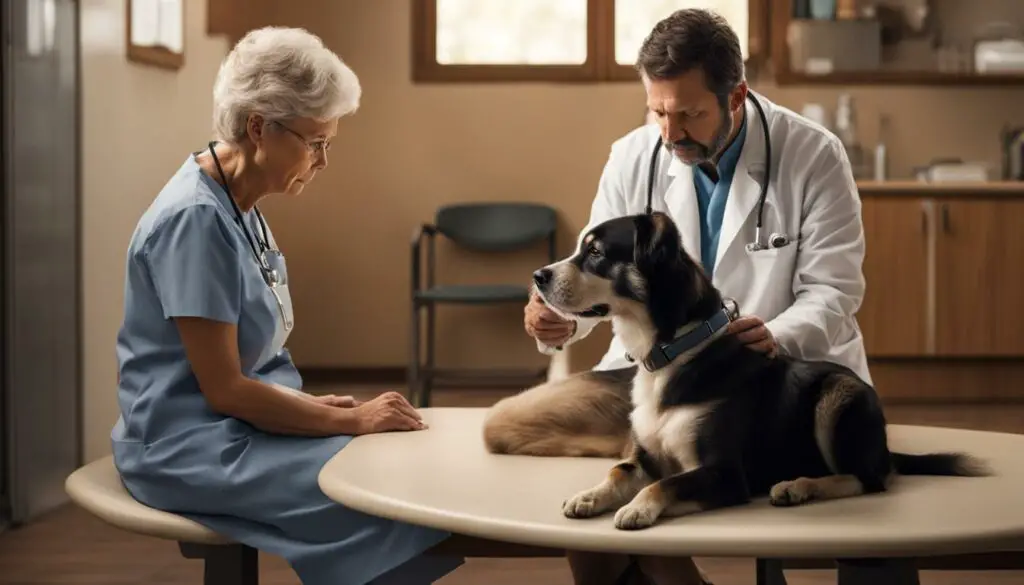
Embracing the Unconditional Love of Your Dog
As my dog ages, I am constantly reminded of the deep emotional bond we share. The unconditional love and unwavering loyalty that my senior dog gives me is truly remarkable. Despite the physical changes and limitations that come with age, their love remains constant and unwavering. It is a reminder to me of the beauty and strength of the human-animal connection.
Spending time with my aging dog has become even more meaningful. We take leisurely walks together, enjoying the simple pleasures of being in each other’s company. I am more attuned to their needs, adapting their routine and providing comfort in any way I can. It is a mutual exchange of love and support, as we navigate this new phase of life together.
“The love and bond you share will provide comfort and carry on even after they are gone.”
Reflecting on the happy memories we have created over the years brings me joy and a sense of comfort. I often find myself flipping through a photo album filled with snapshots of our adventures and heartwarming moments. These memories serve as a testament to the joy and love my dog has brought into my life. Whenever I feel a pang of sadness or nostalgia, I look at those pictures and remember that our bond transcends time and space.
Embracing the Unconditional Love of Your Dog
It is essential to acknowledge and appreciate the love and companionship that our aging dogs provide. Their presence is a constant reminder of the beauty of the present moment. By focusing on the deep bond we share and savoring the time we have left, we can find solace and strength during this emotional journey.
| Advantages of Embracing the Unconditional Love of Your Dog | How It Helps |
|---|---|
| Brings comfort during emotional challenges | Reminds you that you are not alone and provides emotional support |
| Offers a sense of purpose and companionship | Provides a reason to stay active and engaged |
| Helps in finding strength during difficult times | Allows you to focus on the positive aspects of life and find joy in the present moment |
Embracing the unconditional love of your aging dog is a powerful way to cope with the emotional challenges that come with their aging process. By cherishing the present moments, remembering the happy memories, and nurturing the deep bond you share, you can find comfort and strength during this journey.
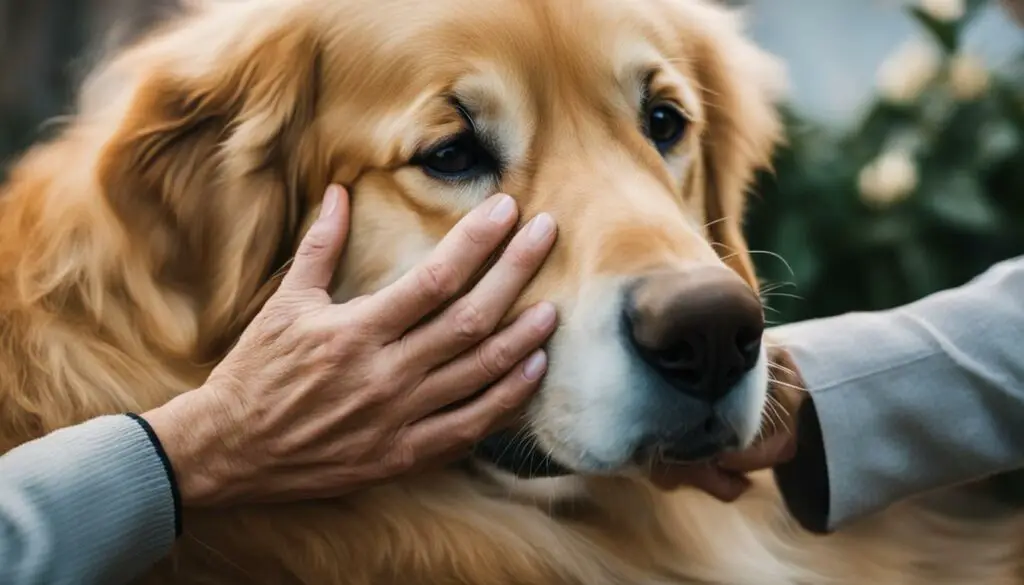
Taking Care of Yourself
While dealing with the challenges of your aging dog, it’s crucial to prioritize your own well-being. Taking care of yourself will not only benefit you but also enable you to provide better support and care for your furry companion. Here are some essential self-care practices to help you navigate this emotional journey:
- Set aside time for relaxation and rejuvenation. Engage in activities that bring you joy and help you de-stress, such as reading a book, practicing yoga, or taking a soothing bath.
- Stay connected with loved ones. Share your feelings and concerns with family and friends who can offer support and understanding. Talking about your emotions can provide comfort and help alleviate some of the sadness you may be experiencing.
- Prioritize physical exercise. Regular exercise not only benefits your physical health but also has a positive impact on your mental well-being. Take walks or engage in activities that allow you to spend time outdoors and enjoy the company of your aging dog.
- Seek professional help if needed. If you find yourself struggling to cope with the emotional toll of your dog’s aging process, consider reaching out to a therapist or counselor who can provide guidance and support.
“Self-care is not selfish; it’s essential. Remember that taking care of yourself is just as important as caring for your aging dog. Prioritizing your well-being will help you navigate this emotional journey with resilience and strength.”
By taking care of yourself, you can better manage the emotional challenges that come with your dog’s aging process. Remember to be kind to yourself and find solace in self-care activities that bring you comfort and relaxation. Your well-being matters, and by prioritizing it, you can provide the love and support your aging dog needs.
Additional Resources
For more information on self-care while dealing with an aging dog, consider checking out the following resources:
- Psychology Today – Self-Care Tips for Pet Parents
- American Kennel Club – Caring for Your Senior Dog
- PetMD – Caring for Your Senior Dog

| Self-Care Tips | Benefits |
|---|---|
| Engage in relaxation activities | Reduces stress and promotes mental well-being |
| Stay connected with loved ones | Provides support and understanding |
| Prioritize physical exercise | Improves physical and mental health |
| Seek professional help if needed | Offers guidance and support |
Acknowledging the Inevitable
Accepting the aging process of a dog and facing the reality of an aging dog can be emotionally challenging. It’s natural to feel a sense of sadness and grief as we watch our beloved furry friends grow older. However, acknowledging and embracing this inevitability is an important part of the journey we share with our dogs.
As much as we may wish for our dogs to stay young and vibrant forever, the reality is that their time with us is limited. By accepting this fact, we can shift our focus to cherishing the time we have left and making the most of every moment. It’s a reminder to be present, to love unconditionally, and to appreciate the joy our dogs bring into our lives.
The aging process is a natural part of life, both for humans and our four-legged companions. While it may be difficult to see our dogs slow down or experience health issues, it’s important to remember that they have lived a life filled with love and happiness. Our role as pet owners is to provide comfort, support, and the best possible care during their golden years.
Mourning the Loss
When the time comes to say goodbye to your aging dog, it is natural to experience grief and sadness. Coping with the death of a pet is a deeply personal journey, and it is important to allow yourself to mourn the loss in your own way. Recognize that your feelings of grief are valid and give yourself permission to grieve.
During this difficult time, it can be helpful to seek support from loved ones or consider joining a pet loss support group. Sharing your emotions and memories with others who have experienced similar losses can provide comfort and understanding. Talking about your feelings and sharing stories about your beloved dog can be therapeutic and help you navigate through the grieving process.
It is also important to take care of yourself during this period of mourning. Engage in self-care activities that help you find solace and maintain your emotional well-being. This could include spending time in nature, practicing mindfulness or meditation, journaling your thoughts and feelings, or seeking professional counseling if needed.
Remember that grieving takes time and that there is no right or wrong way to mourn the loss of your furry friend. Each person’s grief journey is unique. As you mourn the loss of your aging dog, be patient with yourself and allow the healing process to unfold naturally. In time, you will be able to cherish the memories you shared with your beloved pet and find solace in the love that will always remain in your heart.
Quotes:
“The pain of losing a pet is profound. It is okay to feel sad, and it is important to allow yourself to grieve.” – Anonymous
“Grieving the loss of a pet is an emotional roller coaster. Be kind to yourself and give yourself permission to feel and heal.” – Unknown
“The death of a beloved pet leaves a void in our hearts, but the love and joy they brought into our lives will forever remain.” – Anonymous
Find solace in the memories and love you shared with your aging dog. Cherishing their legacy and honoring their memory can bring comfort as you navigate through the grieving process.
Remembering Their Legacy
When we say goodbye to our aging dogs, it can be a heartbreaking experience. However, it’s essential to remember the impact they had on our lives and keep their memory alive. By honoring their legacy, we can find solace and comfort in the beautiful moments we shared with them.
One way to remember their legacy is by creating a memorial. This can be a small plaque or stone in your garden or a special spot in your home where you can pay tribute to your beloved dog. You can also consider planting a tree or flowers in their memory, serving as a living reminder of their presence in your life.
Another meaningful way to keep their memory alive is by participating in activities that were meaningful to them. If your dog loved going for long walks or playing in the park, continue doing those activities and reflect on the joy they brought to both of you. Additionally, you can consider volunteering or donating to animal shelters or organizations in honor of your dog’s memory.
“Our dogs leave paw prints on our hearts,” as the saying goes. They touch our lives in profound ways, and it’s important to cherish their memory. Whether through a memorial, participating in meaningful activities, or finding other special ways to honor their legacy, keeping their memory alive allows us to continue feeling their love and presence long after they have passed away.

Supporting Others Going Through the Same Experience
Dealing with the aging process of a beloved pet can be emotionally challenging, but remember that you are not alone. Many pet owners have experienced similar feelings of sadness and grief. By reaching out and providing support to fellow pet owners, you can create a network of understanding and comfort.
One way to support others going through the same experience is by sharing your own journey. Talk about your emotions, the challenges you faced, and the strategies you found helpful. By opening up, you create a safe space for others to share their own feelings and experiences.
Offering a listening ear is another meaningful way to provide support. Sometimes, people just need someone to talk to and vent their emotions. Your willingness to listen without judgment can make a world of difference and bring a sense of relief to those struggling with the aging process of their pets.
Lastly, offer guidance based on what you have learned from your own experience. Share tips, resources, and recommendations for coping with the emotional toll. Your insights may provide comfort and offer new strategies for others navigating the challenges of their pet’s aging process.
Quotes:
“I found solace in connecting with other pet owners who were going through the same experience. Sharing our stories and supporting each other created a sense of community and understanding.” – Carla, dog owner
“Sometimes, all you need is someone to listen. Being there for others and providing a listening ear can make a tremendous difference in their journey.” – Emily, cat owner
Table: Resources for Supporting Others with Aging Dogs
| Resource | Description |
|---|---|
| Online forums and support groups | Join virtual communities where pet owners share their experiences and provide support to one another. |
| Local pet owner meetups | Attend local gatherings or events where pet owners come together to connect and offer support. |
| Books and articles | Recommend helpful literature that provides guidance and insights on coping with the emotional toll of an aging pet. |
| Veterinary clinics | Inquire about support groups or counseling services offered by veterinary clinics for pet owners. |
| Online counseling services | Suggest online platforms that offer professional counseling services for individuals struggling with pet loss and grief. |
Remember, by supporting others going through the same experience, you not only provide comfort and understanding but also find healing and reassurance for yourself. Together, you can navigate the emotional journey of caring for aging pets and find strength in the shared love for your furry companions.
Embracing the Journey
As my dog enters the twilight years of their life, I have learned to embrace the journey of their aging process. It is a time filled with both joy and sadness, but by shifting my perspective, I have come to see the beauty in this stage of life. While it can be emotionally challenging, there are moments of pure love and companionship that make it all worthwhile.
Instead of focusing on the inevitable loss that will come, I choose to cherish the present moments with my aging dog. We take leisurely walks together, enjoying the sights and sounds of nature. I adapt our routine to accommodate their physical limitations, finding new ways to engage and bond with them. Whether it’s cuddling on the couch or playing gentle games, these small moments of connection bring immense happiness to both of us.
Looking back on the memories we have created over the years brings me comfort during this emotional time. I have created a photo album, filled with pictures of our happiest moments together. When I browse through those pages, I am reminded of the unconditional love and joy my dog has brought into my life. These memories serve as a reminder of the incredible bond we share and provide solace when I am missing them the most.
The journey of my aging dog has taught me to find beauty in the present moment and to appreciate the time we have together. Each wag of their tail, each gentle lick on my hand, is a reminder of the love and companionship that I am blessed to experience. While there may be challenges along the way, embracing this journey allows me to savor the precious moments and make the most of the time we have left.

Table: Comparing the Stages of Life
| Stage | Characteristics |
|---|---|
| Puppyhood | Boundless energy, rapid growth, and exploration. |
| Adulthood | Peak physical condition, active and playful. |
| Senior Years | Slower pace, increased vulnerability to health issues, but a deeper bond and wisdom. |
Conclusion
As a pet owner, coping with the aging process of your beloved dog can be emotionally challenging. Watching them grow old comes with a range of emotions, from sadness to grief. However, by implementing healthy strategies and seeking support, you can navigate the challenges and find solace in this journey.
It’s important to cherish the present moments with your aging dog and create happy memories together. Spend quality time engaging in activities they enjoy, adapting their routine to accommodate any physical limitations. By focusing on the love and joy you share, you can find comfort and strength during this emotional time.
Remembering the happy memories and creating a photo album or a collection can bring comfort and remind you of the wonderful times you had together. Embrace the unconditional love your aging dog provides and stay positive, providing a sense of security and comfort for them. Additionally, reaching out to friends, family, or fellow pet owners can offer support and understanding.
When the inevitable time comes to say goodbye to your aging dog, allowing yourself to mourn the loss and seeking support can be crucial in navigating the grieving process. Remember their legacy and find ways to honor their memory, bringing a sense of comfort and peace. Lastly, embrace the journey, finding beauty in each stage of your dog’s life.
FAQ
How can I cope with the sadness of my dog getting old?
It’s natural to feel sad when your dog is aging. Focus on making the most of the time you have together, create happy memories, and cherish each moment.
What are the signs that indicate my dog is aging?
Look out for changes in weight, hearing and vision problems, dental issues, and decreased energy levels.
How can I care for my old dog?
Provide proper nutrition, regular exercise, and veterinary care tailored to their specific needs.
How can I make the most of the time I have with my aging dog?
Engage in activities they enjoy and adapt their routine to accommodate any physical limitations they may have.
What can I do to cope with the emotional challenges of my dog’s aging process?
Create a photo album or collection of happy memories together to bring comfort and remind you of the wonderful times you had.
How can I stay positive and provide comfort for my aging dog?
Remain calm, positive, and provide a sense of security. Dogs are perceptive and can pick up on their owners’ emotions.
Where can I find support while dealing with the emotional toll of my dog’s aging process?
Reach out to friends, family, or fellow pet owners who understand and empathize with your feelings. Talking about your emotions can provide comfort.
Should I seek guidance from professionals while dealing with my aging dog?
Consider consulting a veterinarian for valuable advice and support tailored to your dog’s specific needs. They can help navigate the challenges of caring for an aging dog.
How can I embrace the unconditional love of my aging dog?
Focus on the deep bond you share and the joy they bring to your life. Appreciate their unwavering love and find comfort and strength in it.
How can I take care of myself while dealing with the challenges of my dog’s aging process?
Engage in self-care activities that help you relax and recharge. Prioritize your well-being by engaging in hobbies, exercising, or spending time with loved ones.
How can I accept the inevitability of my dog’s aging process?
Acknowledge and embrace the reality that our furry friends won’t be with us forever. Make the most of the time you have together and cherish every moment.
How can I cope with the loss of my aging dog?
Allow yourself to mourn and grieve in your own way. Seek support from loved ones or consider joining a pet loss support group to help navigate through the grieving process.
How can I remember the legacy of my aging dog?
Find ways to honor their memory, such as creating a memorial or participating in activities that were meaningful to them. Keeping their memory alive can bring comfort and peace.
How can I support others going through the same experience with their aging dogs?
Share your own experiences, offer a listening ear, and provide guidance based on what you have learned. Supporting others can be healing for both parties involved.
How can I embrace the journey of my dog’s aging process?
Embrace each stage of your dog’s life and appreciate the unique lessons and joys they bring. Find solace and appreciation in the time you have with your aging dog.






